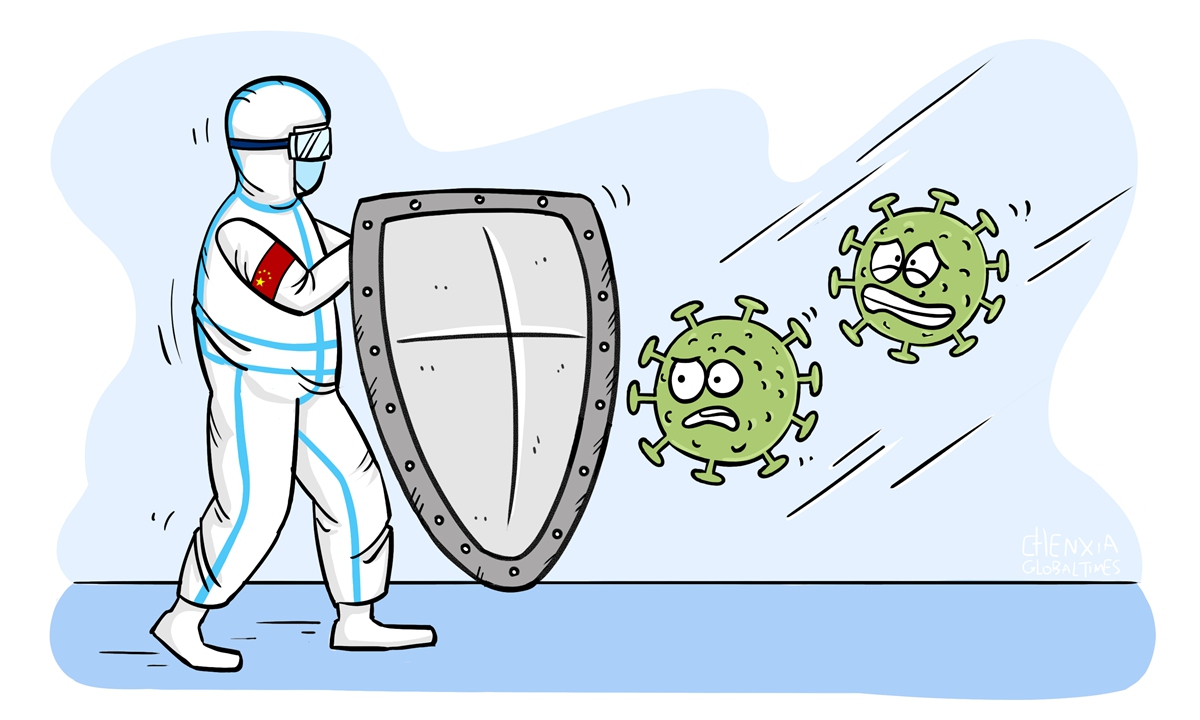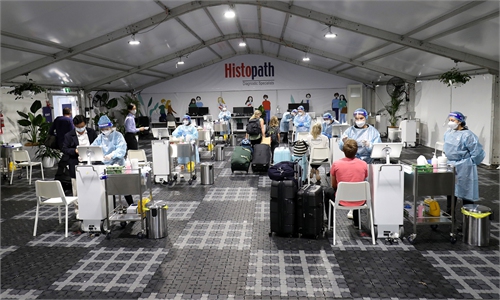COMMENTS / EXPERT ASSESSMENT
Nervous about Omicron and other variants? Maintain vigilance

Illustration: Chen Xia/Global Times
The world has yet to see a light at the end of the tunnel, although the coronavirus pandemic has ravaged our globe for almost two years. Now, the new Omicron variant is spreading twice as fast as the highly infectious Delta mutant, and scientists say even vaccinated people cannot evade Omicron and risk sickness and hospitalization. It is almost certain the pandemic's onslaught will continue in 2022.In Britain where the vaccination rate has reached more than 70 percent, more than 10,000 new Omicron cases have been reported in the UK in the highest increase so far. In the US, more than 120,000 new cases are being reported daily and the country's pandemic death toll has exceeded 800,000. Each day over 1,000 Americans succumb to the pathogen. In the New York state alone, more than 20,000 new cases were reported on Friday, and epidemiologists warn that an "Omicron Storm" may envelop the US soon.
It is clear there will continue to be periods of substantial uptick and sudden flare-ups in coronavirus cases, though many in developed Western countries are becoming increasingly fatigued when it comes to precautionary measures, and in the new year there are likely to be more street protests against travel and gathering restrictions, or mask mandates.
As a matter of fact, people in the US and Europe have hoped for their policymakers to formulate sensible, significantly better measures to deal with the virus, but their governments have largely failed them.
Take the two US administrations for instance, both Trump and Biden have been seriously flawed in containing the pandemic in the US, and neither have put fighting the disease as the No 1 task on their agenda, despite repeated claims that American people's health comes first. Compared to these Western governments' incompetence, China's "dynamic zero virus case" strategy has been highly successful. Over the past two years, the country has contained up to 30 sporadic outbreaks, including the latest efforts to stifle a flare-up in coastal Zhejiang Province.
And, China's playbook is available for everyone to see - mask mandates on mass transit systems and in indoor gatherings, hospital vigilance to detect earliest cases, intensive testing, aggressive contact tracing, two or three-week mandatory quarantine in designated localities, and special hospital wards to treat the infected.
The strategy is very popular among Chinese people because it has enabled life to return largely to normal as most Chinese cities and villages are now free of the virus. Thanks to the "dynamic zero virus case" strategy, China's economy is expected to grow by more than 8 percent in 2021 with urban unemployment rate being maintained at 5 percent.
Unlike the US, China's manufacturing sector, the world's largest, is humming again, which, together with the country's advanced transportation infrastructure, has ensured a stable domestic supply chain. As a result, the inflation rate is kept low at around 2 percent, in sharp contrast to the elevated 6.8 percent spike in the US, where the Biden administration's plush spending programs and the Federal Reserve's extraordinary loose monetary policy are two major culprits.
China's strict containment policy has also led to robust export growth since mid-2020, boosting its current account balances, the balances of payments surplus and the yuan's strong exchange rate, for the "dynamic zero virus case" strategy allows China's production to normalize quickly, enabling the country to cater for the world's demand of durable goods and daily necessities.
The Chinese people's perseverance, unity in action, and altruism are the bedrock to their support of the government's dynamic zero case policy and help what is achieved today in the country. Once again, the dynamic zero case strategy has highlighted the institutional strength of China's political system to rally all kinds of resources to manage the unprecedented health crisis. Despite their highly sophisticated medical technology, the US and other G7 nations have registered many more coronavirus-induced infections and deaths than China.
It is well known that China's effective policy has brought significant human and economic benefits, but Biden and the Western governments will not learn from China's playbook and ramp up their pandemic containing measures. They look for ways to "live with" the pathogen and its mutations, and some Western politicians and media are constantly raising questions about how long China should maintain its current anti-epidemic approach, and whether China's policy is sustainable. These people have kept their heads in the sand for two years, refusing to admit Chinese policy's effect and efficacy.
In Chinese people's eyes, the US and other Western governments do not have faith in their political and societal systems in containing the pandemic, and, the people there do not have trust in their government, either. Their attitude of aiming to coexist with the pathogen, and their so-called "flattening the curve" policy, just don't work. The Delta variant hammered many in the West earlier this year, and now, these countries face another bout of test of the new Omicron variant. By all metrics, China will continue to stick with the dynamic zero-case approach, because any relaxation of the previous efforts would put the country's hard-won gains at risk. Beijing will host the Winter Olympics in February and Winter Paralympics in March, when the dynamic zero-case policy will be tested. For the safety of all attending athletes and officials, during the games all effective inbound quarantine measures should be strictly enforced to avoid cross-infection.
Looking forward to 2023, China could begin to search for pathways to relax the controls. As respiratory specialist Zhong Nanshan has advocated, those pathways included developing effective drug treatments, a very high vaccination rate, limiting the death rate to around 0.1 percent, and keeping the coronavirus' reproduction number to between 1 and 1.5.Now, two years into this pandemic, it is clear that the coronavirus is not going to disappear anytime soon. Rather than being anxious over the unknown tomorrow and tense at every bit of virus news, it is better for China to remain cautious and vigilant. Do not relax.
The author is an editor with the Global Times. bizopinion@globaltimes.com.cn



